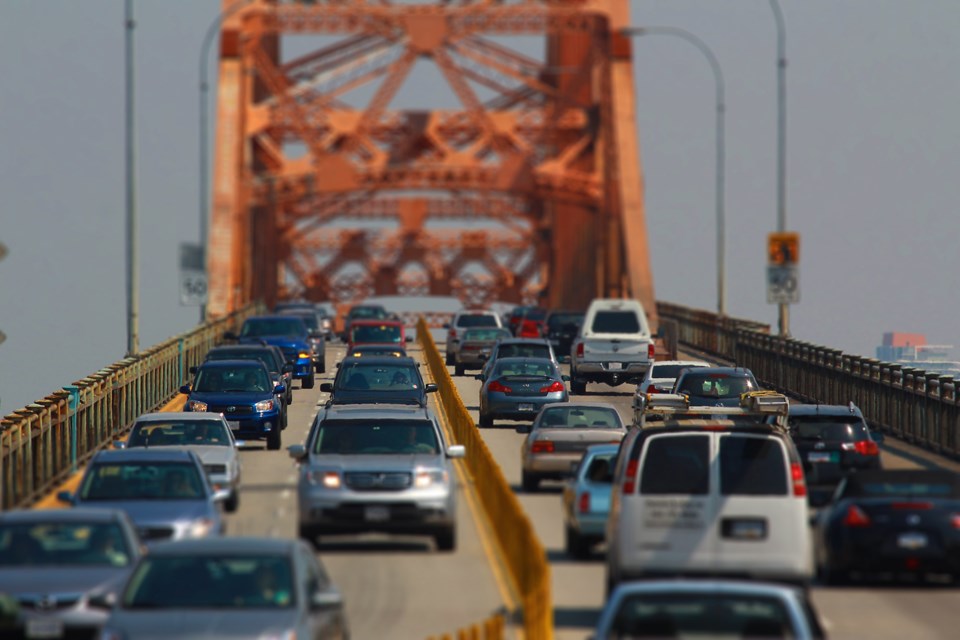The fate of the Pattullo Bridge replacement project is as clear as the skies over Metro Vancouver.
Prior to the recent transit and transportation referendum, TransLink was working with New Westminster, Surrey and Coquitlam on a public process related to the replacement of the aging Pattullo Bridge. The plan is to replace the existing bridge with a new four-lane, tolled Pattullo Bridge.
“I think the referendum results have created a bit of uncertainty for the Pattullo Bridge project,” Mayor Jonathan Cote told the Record. “Ultimately, I still believe it’s a project that will have to happen. They are doing significant rehab work next year, and that might buy a little extra time. But having said that, ultimately something needs to be done with the Pattullo Bridge.”
In an attempt to raises funds to expand the region’s transit and transportation systems, the Mayors’ Council on transportation planning proposed a 0.5 per cent increase to the provincial sales tax in Metro Vancouver. The money raised would have funded a wide range of transportation and transit initiatives, including a new Pattullo Bridge.
“Regardless of the plebiscite vote, the structural and seismic rehabilitation will go ahead to ensure safety of motorists, cyclists and pedestrians on the bridge,” said Chris Bryan, TransLink’s media relations advisor, in an emailed statement to the Record. “That work is already budgeted and will extend the life of the bridge for some years until a longer-term decision about replacement is required. Deck work is expected to begin in mid-2016.”
Jim Lowrie, the city’s director of engineering, said it was anticipated the capital costs of the Pattullo Bridge replacement project would be offset by user fees and contributions from senior levels of government.
“Accordingly, it is the city’s expectation that the Pattullo Bridge replacement project will proceed regardless of the referendum outcome,” Lowrie said.
Cote said tolling has been identified as the main source of funding for the replacement of the Pattullo Bridge.
“Even though there is a bit of a shortfall in terms of funding because of the results of the referendum to cover the costs of the bridge, I think there’s still an opportunity, once everyone gets back to the table and starts working on it, that funding will be identified and the tolling will remain the large source of funding for the project,” he said.
Cote said the plan has been to toll the new bridge and use that money to pay for the debt financing. He said he’d be open to tolling the existing bridge to help pay for repairs and help with money to pay for the new crossing, but there hasn’t been a lot of appetite from TransLink on that idea.
“With the age of the structure, certainly all the information we have shows that tolls would dramatically reduce the amount of traffic on that bridge, which certainly would be a benefit to the City of New Westminster. As far as I am concerned, that plan is still the plan for the Pattullo Bridge,” he said. “Having said that, I think everyone is still trying to figure out what a No means in the referendum and what happens to the mayors’ plan and all the projects that are included in that. The reasons you are getting mixed messages is the referendum has certainly made things unclear as far as the future of transportation in Metro Vancouver.”
Along with TransLink, the province has committed to contribute funds for the Pattullo Bridge replacement, and TransLink planned to seek a federal grant.
“I so strongly believe in the mayors’ plan and the investments, both in road infrastructure and public transit, that need to be made in our region,” Cote said. “I think the No result might be putting a pause on things, but ultimately, the provincial government and the mayors need to get back to the table and figure this out. I don’t think our region can afford to just ignore this problem.”



